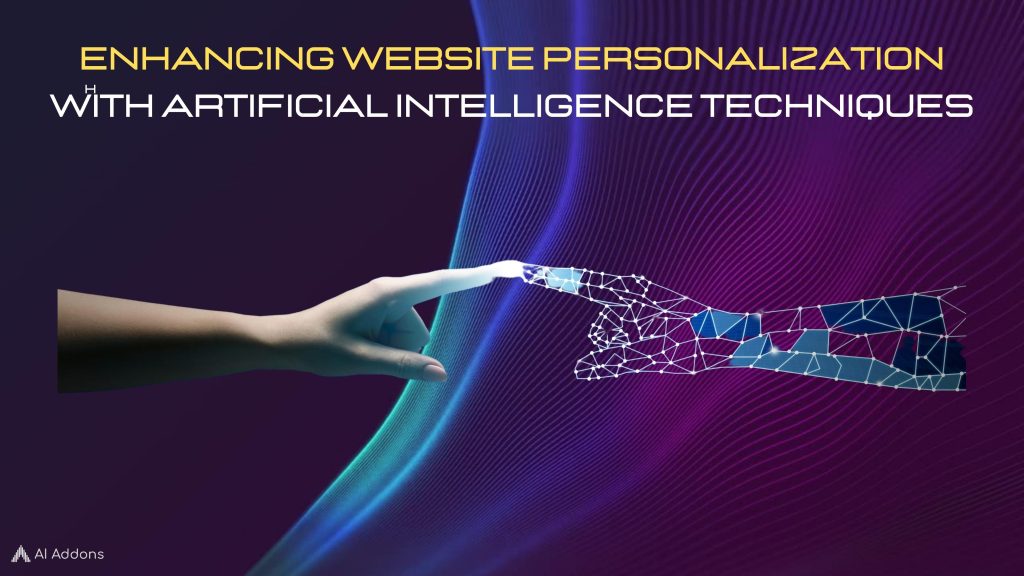In today’s digital era, personalization has become a key element in delivering exceptional user experiences on websites using Artificial Intelligence. Users expect tailored content, recommendations, and interactions that cater to their unique preferences and needs.
Artificial Intelligence
Artificial intelligence (AI) techniques have emerged as powerful tools for enhancing website personalization, enabling businesses to provide highly relevant and engaging experiences to their visitors.
The first industries to gain from artificial intelligence are marketers. With the help of this technology, it is now able to create a unified customer perspective and gain a comprehensive understanding of each unique consumer. However, many marketers are still unsure about the capabilities and use of AI.
In this blog, we will explore the various AI techniques that can be employed to enhance website personalization and delve into their benefits and applications.
- Understanding Website Personalization: Website personalization involves customizing the content, layout, and functionality of a website to suit the individual preferences and characteristics of each visitor. Traditional personalization techniques often rely on explicit user input, such as registration data or user preferences gathered through surveys. However, AI techniques go beyond these methods by leveraging user behavior data, machine learning algorithms, and predictive analytics to create dynamic and real-time personalization experiences.
- Machine Learning for User Behavior Analysis: One of the key AI techniques used in website personalization is machine learning, which enables websites to analyze user behavior patterns and make data-driven decisions. Machine learning algorithms can process vast amounts of user data, including clickstreams, navigation paths, and engagement metrics, to understand individual preferences, interests, and intents. By analyzing this data, websites can dynamically personalize content recommendations, product suggestions, and user interfaces in real time.
- Recommendation Systems for Personalized Experiences: Recommendation systems powered by AI are at the forefront of enhancing website personalization. Collaborative filtering and content-based filtering algorithms can be employed to generate personalized recommendations based on user preferences and similarities with other users. These systems can suggest relevant products, articles, or content that align with the user’s past behavior, leading to increased engagement, higher conversions, and improved customer satisfaction.
- Natural Language Processing for Personalized Interactions: AI-powered natural language processing (NLP) techniques enable websites to provide personalized interactions and seamless user experiences. Chatbots and virtual assistants can understand and respond to user queries, providing tailored information and assistance. Sentiment analysis can help gauge user emotions and tailor responses accordingly. NLP can also be used to analyze user-generated content, such as reviews and comments, to gain insights into user preferences and sentiments.
- Dynamic Content Generation and A/B Testing: AI techniques can enable websites to generate dynamic content based on user preferences and behavior. By employing natural language generation (NLG) algorithms, websites can automatically create personalized content such as product descriptions, blog posts, or email newsletters. A/B testing, combined with AI, allows websites to experiment with different variations of content, layouts, and calls-to-action, optimizing personalization strategies to deliver the best possible user experience.
- Privacy and Ethical Considerations: While AI techniques offer immense potential for website personalization, privacy, and ethical considerations must be carefully addressed. Websites must prioritize user consent, transparency, and data security. Implementing robust privacy policies and ensuring compliance with data protection regulations is crucial to maintaining trust and safeguarding user information.
Conclusion
Artificial intelligence techniques are revolutionizing website personalization, empowering businesses to deliver personalized experiences that engage and satisfy their users. By leveraging machine learning, recommendation systems, natural language processing, and dynamic content generation, websites can create tailored experiences that cater to individual preferences, increase engagement, and drive conversions.
However, it is essential for organizations to strike a balance between personalization and user privacy, ensuring that ethical considerations and data protection measures are in place. As AI continues to advance, the future of website personalization holds even more exciting possibilities, paving the way for immersive and hyper-personalized digital experiences.
